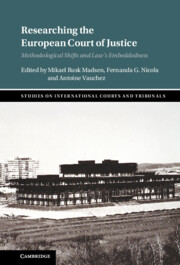Book contents
- Researching the European Court of Justice
- Studies on International Courts and Tribunals
- Researching the European Court of Justice
- Copyright page
- Contents
- Notes on Contributors
- 1 From Methodological Shifts to EU Law’s Embeddedness
- Part I Cases
- Part II Judicial Frames
- Part III Socio-legal Practices
- 10 The Genesis of the Institution within the Institution
- 11 Reconstructing the Construction of Laval
- 12 Judicially-backed Mutation
- 13 Media Attention for CJEU Case Law
- 14 Conclusion: Embedding Decoloniality in Empirical EU Studies
- Index
10 - The Genesis of the Institution within the Institution
Studying the Mobilization for the Creation of the Court of First Instance
from Part III - Socio-legal Practices
Published online by Cambridge University Press: 05 May 2022
- Researching the European Court of Justice
- Studies on International Courts and Tribunals
- Researching the European Court of Justice
- Copyright page
- Contents
- Notes on Contributors
- 1 From Methodological Shifts to EU Law’s Embeddedness
- Part I Cases
- Part II Judicial Frames
- Part III Socio-legal Practices
- 10 The Genesis of the Institution within the Institution
- 11 Reconstructing the Construction of Laval
- 12 Judicially-backed Mutation
- 13 Media Attention for CJEU Case Law
- 14 Conclusion: Embedding Decoloniality in Empirical EU Studies
- Index
Summary
This chapter develops a sociological approach to legal institutions by looking at the genesis of the Court of First Instance (CFI). This European Court has remained largely under the radar of EU law studies. Research often consider the CJEU as a homogeneous and monolithic body and provides a functionalist explanation for the creation of the CFI: because of the case overload, a new court was needed to check the facts of complex cases. But this explanation is not sufficient to understand how a project, discussed since 1974, was added to the agenda of the intergovernmental conference only at the last-minute in 1985. Additionally, the first project, a Civil service tribunal was progressively abandoned in favour of a court with extensive competences, notably in competition law. Through the study of institutional archives with a sociological lense, the author shows that rather than a top-down decision, political mobilization was essential for the creation of the CFI. The chapter shows that the CFI creation was promoted by a coalition of transnational actors: EU officials and lawyers acting as legal entrepreneurs. Hence, the chapter highlights the need to reintegrate the CJEU and its members in broader networks of actors and institutional chains of interdependence.
Keywords
- Type
- Chapter
- Information
- Researching the European Court of JusticeMethodological Shifts and Law's Embeddedness, pp. 237 - 260Publisher: Cambridge University PressPrint publication year: 2022



